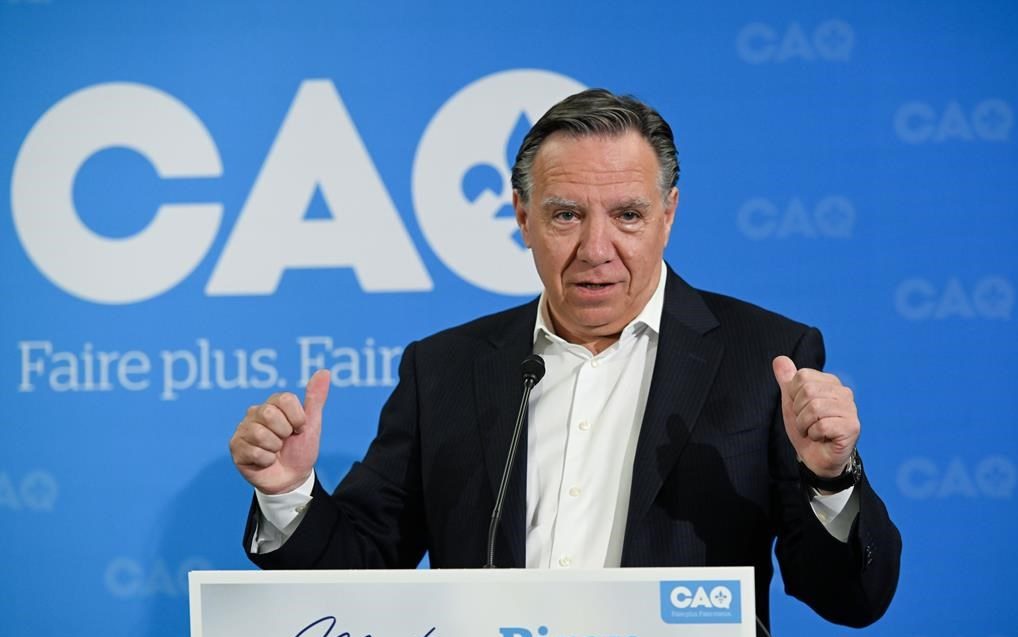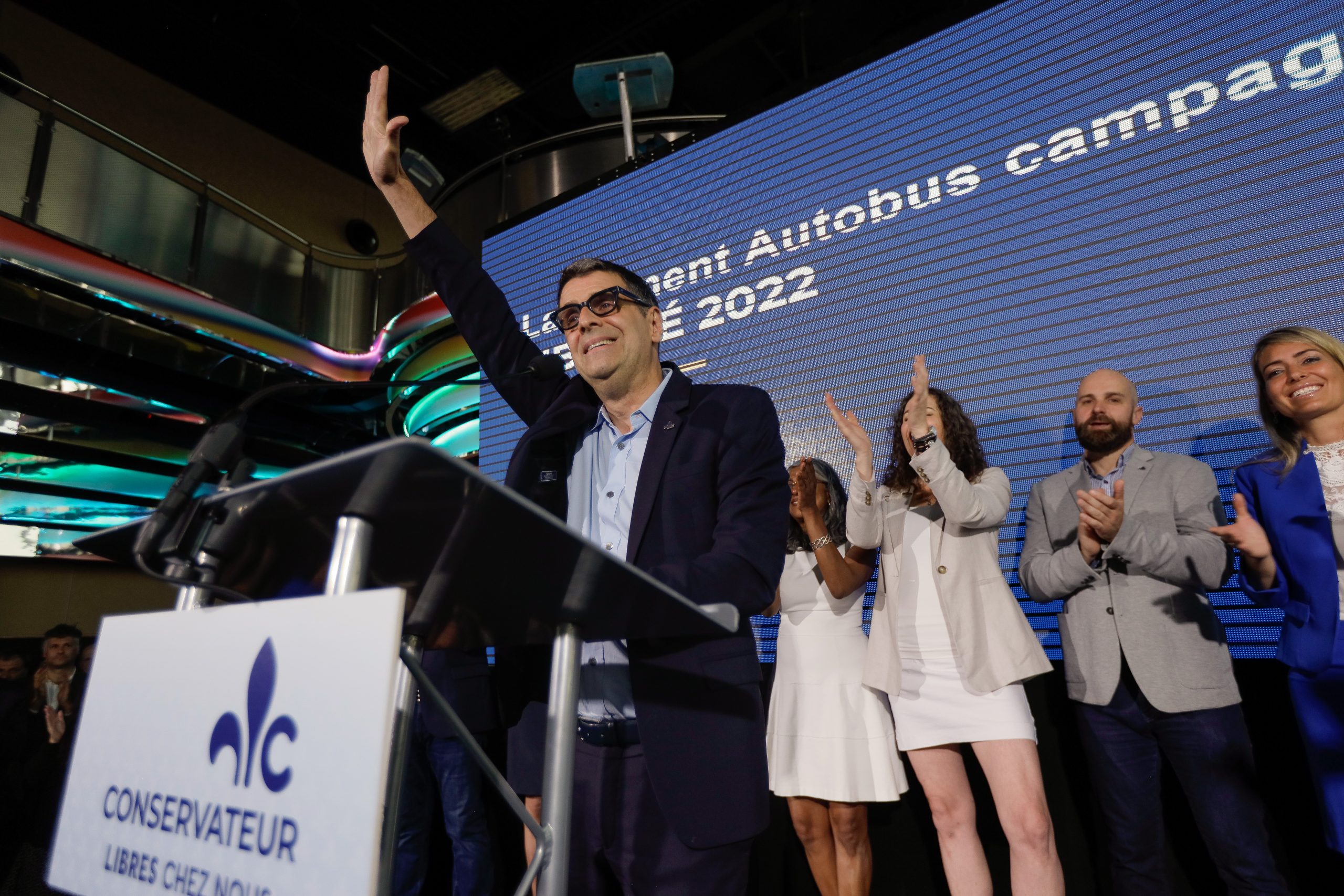Despite polls, Legault’s CAQ not guaranteed a majority: political analyst

Posted August 28, 2022 12:50 pm.
Last Updated August 28, 2022 6:58 pm.
While polls suggest Francois Legault’s Coalition Avenir Quebec will cruise to an overwhelming majority victory in the Oct. 3 election, one political analyst says: not so fast.
Karim Boulos acknowledges the election is Legault’s to lose – with most polls showing the CAQ leader with support in the mid-40 per cent range – but the political analyst says things can change very quickly over a 36-day campaign.
BACKGROUND: Quebec’s election campaign has officially begun, election day is Oct. 3
He says missteps or slip-ups or a loss of traction could translate into a minority victory instead of a majority.
“One scandal will completely derail a campaign,” said Boulos. “One bit of good news, one huge endorsement could completely change the course of a campaign.
“Polls today – which I don’t believe anymore – but the polls today show that he’s going to have a majority again. But we haven’t seen what others have up their sleeves. We don’t know how the campaign is going to go.
“These 36 days can make or break you.”

Montage of five party leaders in Quebec. Top: Francois Legault (left) and Gabriel Nadeau-Dubois. Bottom: Dominque Anglade (left), Paul St-Pierre Plamondon (middle) and Eric Duhaime (right). (Credits: Facebook/respective political party pages)
‘It’s Legault’s to lose’
But Boulos doesn’t deny Legault is riding high.
He says his COVID-19 pandemic track record is a big reason for the support heading into the campaign, as well as his popularity among francophones in Quebec’s regions.
He also points to vote splitting and the fragmentation of the opposition – including the demise of the Liberals – as reasons for Legault’s potential success.
“It’s about keeping his troops aligned,” said Boulos. “It’s about making sure that nobody says anything silly to derail the lead that he currently has. Because as we stand today, it’s Mr. Legault’s to lose. He would only have to blame himself if things went sideways.
RELATED:
- Where do Quebec’s five main parties stand on election issues?
- Quebec’s CAQ leads rivals in fundraising ahead of election, Liberals in last place
- CAQ, Quebec Solidaire say more than 50% of candidates will be women
“I think Mr. Legault is in a position that he’s just really got to do nothing, just shake hands. Don’t say much. Announce a few little things or sprinkle some money like they always do during the campaign. But really, it’s his to lose.”
Days before the campaign launched, poll-aggregator website QC125.com pegged the probability of Legault’s party winning a majority government at more than 99 per cent.
“I think he has to just remind people that the pandemic was terrible,” said Boulos. “He stepped up when it was needed. They did all the right things. And set the tone and were exemplary after that first terrible wave.”
What happened to the Liberals?
Legault’s closest adversary in the polls – though only polling around the 18 per cent mark – are Dominique Anglade’s Liberals.
For one, the Liberals aren’t doing well in the regions, which are mostly francophone.
Last general election, in 2018, the party won four seats outside the greater Montreal area, where its base of anglophone and immigrant voters resides. Since then, the Liberals lost two of those four seats in byelections.
While the party remains in second place across the province, a recent Leger poll put them fourth in the Quebec City region and tied for third outside Quebec’s two largest cities.
“The Liberals have not put up any kind of a fight,” said Boulos.
READ MORE:
- Quebec Liberals struggling to connect with francophone voters ahead of October election
- ‘Vote for Real’: Quebec Liberal Party unveils election slogan
Boulos says part of the Liberals’ fall can be explained by a change in what matters most to Quebecers. While identity may have been a big driving force in the past – with the Liberals being the defenders of anglophones’ and allophones’ rights – other issues have since taken the forefront.
“So I think the issues are going to be more around, you know, elements that matter, like health care, education, the environment and economic growth than just identity politics,” he said.
“The new generation is looking more at environmental questions. It’s not just identity, they’re looking at equity.”
The Liberals were also traditionally seen as the party of the economy, but the CAQ appears to have occupied that position in the minds of many Quebecers.
“They’re looking at job prospects and opportunities,” said Boulos. “And economically, Quebec is doing OK with an all-time low in terms of our unemployment rate in recent history.
“And so I think that people are looking at other issues other than just the identity because we’re almost debating our parents’ fight as opposed to the current fight.”
L'élection est déclenchée !
Aujourd’hui, je mets au défi @francoislegault de parcourir le Québec en répétant aux Québécois qu'il trouve que la pénurie de main-d'oeuvre est une bonne nouvelle.#Dominique2022 #Qc2022 pic.twitter.com/BZzJ0fodV8
— Dominique Anglade (@DomAnglade) August 28, 2022
Impact of Bill 96 on voting trends
Boulos also says Anglade’s Liberals “dropped the ball” on Bill 96, which may have turned some anglophones and allophones off from the party.
Bill 96 is the CAQ’s reform of the province’s French-language law.
“I think there’s a general sense among anglos and people… that the Liberals didn’t stand up for for anglos and allophones,” said Boulos. “And so at this point, you know, I think I don’t know that the English vote is going to be enough of a problem for Mr. Legault.
“He’s not going to pick up any new seats in any anglophone or basic majority anglophone neighborhoods. So I think that there’s going to be a lot of damage control as part of the messaging, but no changes.
“I think whatever damage has been done by Bill 96 is done. I’m pretty certain they’ve run some polls and I think they understand where they’ve lost how many votes. And I think they’re going to then focus on their strengths.”
The rise of Duhaime’s Conservatives
One surprise for Boulos leading up to this campaign period has been Eric Duhaime’s Conservative Party.
The political analyst said he was surprised to see the Conservatives put forth a complete slate of candidates for the election.
READ: Quebec Conservative Party launches 2022 provincial election campaign
“I think that he is one to watch because like anything, people are always enamored by the flavour of the month or the novelty,” said Boulos. “And I think Mr. Duhaime is using opportunities. A couple of days ago, we saw him come out with the gun violence in Montreal, taking a shot both at the mayor of Montreal and at the current premier.”

Conservative Party of Quebec Leader Éric Duhaime gestures as he speaks during a political rally in Quebec City on Sunday August 21, 2022. THE CANADIAN PRESS/Francis Vachon
More parties means vote splitting
Boulos is anticipating vote splitting to play a part in this year’s election, with the CAQ likely benefitting in the end.
He says with more parties than ever before at this stage, vote splitting is going to be “rampant.”
“We do know as well that nobody’s really voted in,” he said. “People are voted out. If you are unhappy with someone’s performance, you vote them out by trying to put somebody else in.
“Every riding is going to be split. And so typically vote splitting helps the incumbent.”
Boulos did suggest Duhaime’s rise in popularity could take votes away from the CAQ, but likely not enough to have a major impact on the election result.
“It’s not as if Mr. Duhaime’s party is going to steal all of Mr. Legault’s votes because they’re quite opposed on a number of other factors. Mr. Duhaime’s position has always been economics that are quite conservative economically, tax cuts and better positions on a business development and attracting international investment. That’s typically the conservative platform.
“So will that be enough to derail Mr. Legault right now?”








